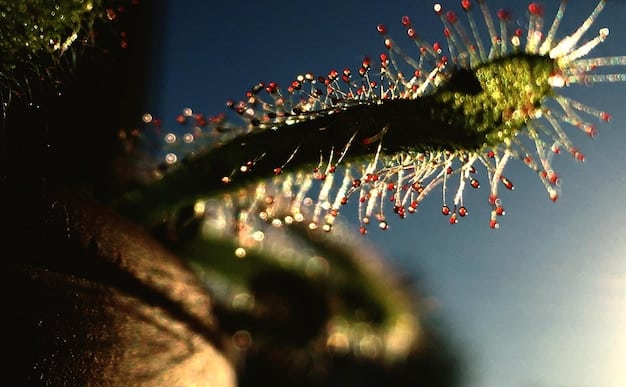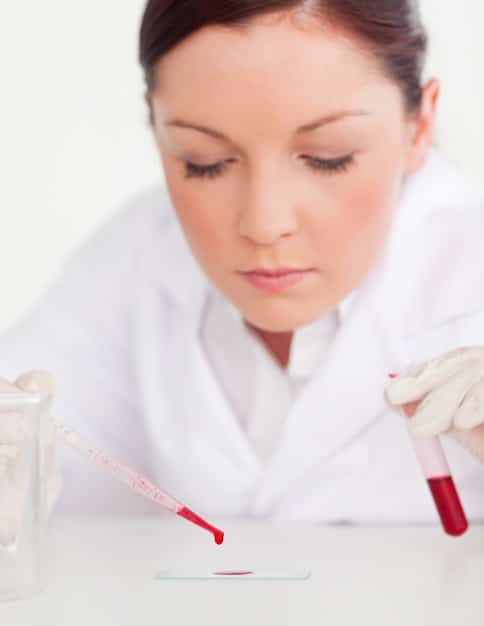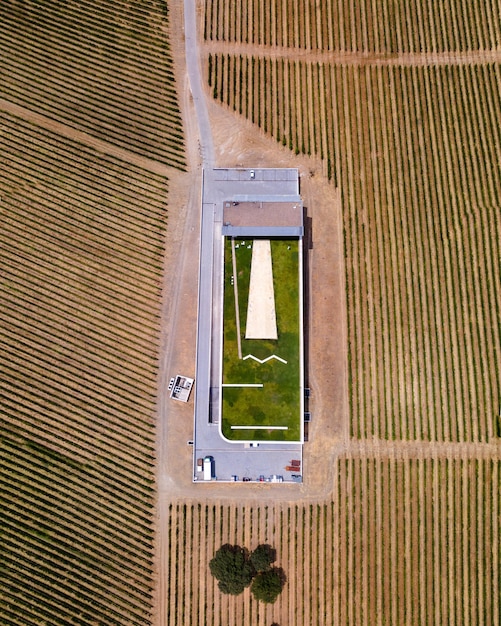Biotechnology Innovations: Transforming Healthcare and Agriculture in the US

Biotechnology innovations in the US are revolutionizing healthcare with advanced diagnostics and personalized medicine, while also enhancing agriculture through gene editing and sustainable farming practices, leading to increased efficiency and improved food security.
The United States is at the forefront of a technological revolution, and biotechnology innovations are leading the charge, transforming healthcare and agriculture. These advancements are not only enhancing our quality of life but also promising a future where diseases are treated more effectively and food production is more sustainable. Ready to explore how biotech is reshaping these critical sectors?
The Rise of Biotechnology in the US
Biotechnology has emerged as a pivotal force in shaping the future of various industries. From groundbreaking medical treatments to sustainable agricultural practices, the US is witnessing a surge in biotechnology innovations that are set to redefine our lives.
Let’s delve into the key areas where biotech is making a significant impact.
What is Biotechnology?
At its core, biotechnology involves using biological systems, living organisms, or derivatives thereof to develop or create different products. This field encompasses a wide range of disciplines, including genetics, molecular biology, biochemistry, and cell biology. The applications are vast and continue to expand as technology advances.
Key Drivers of Biotech Innovation
Several factors are fueling the growth of biotechnology innovations in the US. These include:
- Increased investment in research and development by both public and private sectors.
- Advancements in genetic engineering and gene editing technologies like CRISPR.
- Growing demand for personalized medicine and sustainable agriculture.
- Supportive regulatory frameworks that encourage innovation while ensuring safety.
These drivers collectively create a fertile ground for biotech to flourish and address some of the most pressing challenges in healthcare and agriculture.

Biotechnology in Healthcare: A New Era of Medicine
The healthcare sector is undergoing a seismic shift thanks to biotechnology innovations. These advancements are enabling more precise diagnoses, personalized treatments, and novel therapies that were once unimaginable.
Here’s how biotech is revolutionizing healthcare.
Revolutionizing Diagnostics
Biotechnology is transforming how diseases are detected and diagnosed. Traditional methods are often slow and less accurate. Biotech innovations are providing faster, more precise, and less invasive diagnostic tools.
Gene Therapy: Fixing Genetic Flaws
Gene therapy involves modifying a patient’s genes to treat or cure diseases. This approach has shown tremendous promise, particularly for genetic disorders. Here’s how gene therapy is changing the landscape of healthcare:
- Correcting faulty genes responsible for diseases like cystic fibrosis and hemophilia.
- Enhancing the body’s ability to fight cancer by engineering immune cells.
- Developing treatments for inherited conditions through targeted gene editing.
Personalized Medicine: Tailoring Treatments to Individuals
Personalized medicine, also known as precision medicine, uses an individual’s genetic profile to tailor medical treatment specifically for them. This approach ensures that patients receive the most effective treatment with the fewest side effects.
Biotechnology plays a crucial role in making personalized medicine a reality. By analyzing a patient’s DNA, doctors can identify genetic markers that affect how they respond to certain drugs. This information can guide treatment decisions, leading to better outcomes.
Biotech innovations are not only improving existing treatments but also paving the way for new ones. The integration of genetics, data analytics, and medical technology is creating a new frontier in healthcare that promises to deliver more effective and patient-centered care.
Biotechnology in Agriculture: Cultivating a Sustainable Future
Agriculture faces the monumental task of feeding a growing global population while minimizing environmental impact. Biotechnology innovations are offering sustainable solutions to these challenges, enhancing crop yields, reducing pesticide use, and improving nutritional content.
Let’s explore how biotech is transforming the agricultural sector.
Genetically Modified (GM) Crops: Enhancing Productivity
Genetically modified (GM) crops have been a cornerstone of modern agriculture for decades. These crops are engineered to possess traits that improve yield, resist pests, or tolerate herbicides. While controversies surrounding GM crops exist, their impact on food production is undeniable.
Gene Editing: Precision Agriculture
Gene editing technologies, such as CRISPR-Cas9, allow scientists to make precise changes to a plant’s DNA. This approach offers a more targeted and efficient way to improve crop traits compared to traditional genetic modification.
Sustainable Farming Practices
Biotechnology is also facilitating the development of sustainable farming practices. These include:
- Developing crops that require less water and fertilizer, reducing environmental impact.
- Creating bio-based pesticides and herbicides that are less harmful to the environment.
- Improving soil health through the use of microbial inoculants.
By integrating biotech into agriculture, we can enhance productivity while minimizing the ecological footprint, paving the way for a more sustainable and resilient food system.

Challenges and Opportunities in US Biotechnology
While biotechnology innovations offer immense potential, they also come with their own set of challenges and opportunities. Addressing these issues is crucial to ensuring that biotech continues to thrive and benefit society.
Let’s examine the key challenges and opportunities facing the US biotech industry.
Ethical Considerations
Biotechnology raises complex ethical questions, particularly in areas like gene editing and personalized medicine. Concerns about safety, accessibility, and the potential for misuse must be carefully addressed.
Regulatory Hurdles
The regulatory landscape for biotech products in the US is complex and can be a barrier to innovation. Streamlining the approval process while maintaining rigorous safety standards is essential.
Funding and Investment
Continued investment in biotech research and development is crucial to translate scientific discoveries into real-world applications. Both public and private funding play a vital role in supporting biotech innovation.
Collaborative Partnerships
Collaboration between academia, industry, and government is essential to drive biotech innovation. By pooling resources and expertise, we can accelerate the development and deployment of new technologies.
By navigating these challenges and seizing these opportunities, the US can solidify its position as a global leader in biotech, ensuring that these innovations benefit society as a whole.
The Future of Biotechnology: A Glimpse into Tomorrow
Looking ahead, the future of biotechnology innovations in the US is brimming with promise. As technology continues to evolve, we can expect even more groundbreaking advancements that will transform healthcare and agriculture.
Let’s explore some of the potential future developments in biotech.
Advancements in Gene Editing
Gene editing technologies like CRISPR-Cas9 are becoming more precise and efficient. In the future, we can expect to see these tools used to treat a wider range of genetic diseases and improve crop traits with even greater accuracy.
Integration of AI and Biotech
Artificial intelligence (AI) is poised to play a major role in biotech. AI algorithms can analyze vast amounts of data to identify potential drug targets, predict patient outcomes, and optimize agricultural practices.
Personalized Nutrition
Personalized nutrition involves tailoring dietary recommendations based on an individual’s genetic makeup and health status. Biotechnology can provide the tools to analyze an individual’s unique needs and develop customized nutrition plans.
Biomanufacturing
Biomanufacturing uses biological systems to produce a wide range of products, from pharmaceuticals to biofuels. This approach offers a sustainable alternative to traditional manufacturing processes and has the potential to revolutionize the production of many goods.
These future developments highlight the transformative potential of biotech. By embracing these innovations, the US can build a healthier, more sustainable, and more prosperous future for all.
US Biotech Companies Leading the Way
Several US-based biotechnology companies are at the forefront of innovation, driving advancements in healthcare and agriculture. These companies are investing heavily in research and development and bringing cutting-edge technologies to market.
Here are a few notable examples:
Gilead Sciences
Gilead Sciences is a biopharmaceutical company focused on developing and commercializing antiviral drugs. The company has made significant contributions to the treatment of HIV, hepatitis B, and hepatitis C.
Monsanto (now Bayer Crop Science)
Monsanto, which is now part of Bayer Crop Science, is a leading agricultural biotechnology company. The company develops genetically modified seeds and crop protection products that enhance agricultural productivity.
Amgen
Amgen is a biotechnology company focused on developing innovative therapies for serious illnesses. The company’s portfolio includes treatments for cancer, kidney disease, and osteoporosis.
Corteva Agriscience
Corteva Agriscience is an agricultural company specializing in developing seeds, crop protection products, and digital solutions for farmers. The company is committed to sustainable agriculture and innovation.
These companies exemplify the innovation and entrepreneurial spirit that drives the US biotech industry. Their contributions are essential to addressing some of the most pressing challenges in healthcare and agriculture.
| Key Area | Brief Description |
|---|---|
| 🔬 Advanced Diagnostics | Faster & more accurate disease detection. |
| 🌱 Gene Edited Crops | Improving crop resistance & yields. |
| 💊 Personalized Medicine | Customized treatments based on genetics. |
| 🚜 Sustainable Farming | Reducing environmental impact in agriculture. |
Frequently Asked Questions
▼
Biotechnology uses biological systems to create products. This includes genetics, biochemistry, and cell biology for applications in healthcare and agriculture.
▼
Biotech is enhancing diagnostics, offering personalized treatments, and pioneering gene therapies to treat diseases more effectively than traditional methods.
▼
Gene edited crops are plants with precisely modified DNA, offering improved yields, pest resistance, and reduced need for harmful pesticides in agriculture.
▼
Personalized medicine uses an individual’s genetic profile to tailor medical treatment, ensuring they receive the most effective treatment with the fewest side effects possible.
▼
Biotech promotes sustainable farming through drought-resistant crops, bio-based pesticides, and methods that improve soil health, reducing environmental impact.
Conclusion
In conclusion, biotechnology innovations in the US are revolutionizing healthcare and agriculture, offering solutions to some of the most pressing challenges we face. From personalized medicine to sustainable farming, biotech is paving the way for a healthier and more sustainable future.





